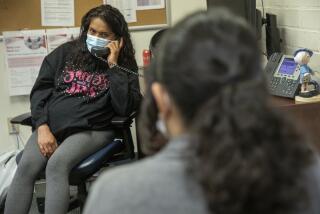Panel to Buy Car Phones for Disabled : Emergencies: Advocates say the cellular devices are a safer alternative to renovating call box areas along freeways.
Under an innovative plan approved Friday, Ventura County could become the first in the state to give portable telephones to physically disabled drivers who cannot easily use freeway call boxes.
The Ventura County Transportation Commission, required by federal law to make call boxes accessible to drivers with disabilities, voted instead to buy cellular phones that will allow such drivers to make 911 calls if their vehicles break down.
The cellular phones, which will cost the commission about $275 each, will only be able to reach 911 unless the user pays for more extensive service.
Those eligible for the phones must be Ventura County residents who have a California drivers license and a physician’s statement concerning their disability.
Advocates for the disabled said providing cellular phones is safer and easier than renovating call box areas along freeway sections that are steep or have narrow shoulders.
“That’s the beauty of this cellular phone idea,” said Wendy Whiting, a Ventura resident who uses a wheelchair. “No one who has a disability has to get out of the car.”
Other agencies may follow Ventura’s example as they seek to comply with a federal law that says people with disabilities must be able to use transportation services--including call boxes--that are available to the general public.
“We’re all slowly coming to the realization that the cellular phone option is the best for safety and accessibility reasons,” said Stephen Finnegan, call box project manager with Los Angeles County’s new Metropolitan Transportation Authority.
Federal officials may not approve the cellular phone plan as a substitute for making call boxes more accessible, county officials said. Although cellular phones would assist drivers who live in Ventura County, disabled motorists from other counties and other states would still be unable to use the existing call boxes.
But Finnegan pointed out that a call box with enough level ground around it for a wheelchair may not help if a disabled driver has car trouble farther down the road.
“Breakdowns occur randomly, and rarely right in front of a call box,” he said. “It doesn’t help you if the call box is accessible but you can’t get to it because of limited shoulder space between the call boxes.”
Finnegan said transportation leaders in the other 11 counties that operate call boxes will watch how the Ventura County plan unfolds.
Linda Galbraith, 49, of Oxnard, who has used a wheelchair since a 1982 traffic accident, lobbied hard for the Ventura County program because she knows how terrifying a freeway breakdown can be.
Two years ago, on a hot afternoon in a remote area of New Mexico, a tire on Galbraith’s van blew out. She placed a makeshift “help” sign in her back window and pleaded in vain for help on her citizen’s band radio before she finally flagged down a police officer--three hours after the breakdown.
“There’s tremendous fear when you go out on the freeways,” Galbraith said. “Hopefully, I will never need (the cellular phone). But it will lift such a heavy burden from me. There’s no other way for us to tell somebody that we need help.”
In a 5-2 vote Friday, the Ventura County Transportation Commission authorized its staff to enter into a contract to buy cellular phones in lots of 100.
The money will come from a $1 vehicle registration surcharge that Ventura County motorists pay toward a fund for call boxes and other emergency highway services.
The commission’s staff is negotiating with a cellular service provider to allow recipients of these telephones to make 911 calls only at no charge.
Two commissioners, County Supervisor Vicky Howard and Thousand Oaks Councilman Frank Schillo, voted against the plan, saying they were concerned about the uncertain costs and the extended-service provision.
“I think the purpose is to provide emergency service,” Schillo said. “I think we should stick to that.”
“I’m troubled because I think there are people out there who can pay for their own cellular phones,” Howard said.
But another commissioner, County Supervisor Susan Lacey, argued that the program could encourage people with disabilities to take more trips outside the home. “I think it’s the right thing to do,” she said, “and I hope it will set an example.”
Commission staff members said they do not know how many disabled drivers live in Ventura County. Commission staff member Chris Stephens said about 150 county residents are licensed to drive with hand controls, but he said other drivers may also be eligible to receive the telephones.
Under the plan, the staff will seek applications from drivers, then obtain the commission’s approval before purchasing each 100 telephones.
The phone plan was the commission’s second recent move toward making it easier for drivers with disabilities to obtain emergency help. Last month, the panel authorized a company to develop a small keyboard that could be attached to each of the county’s 457 call boxes so hearing-impaired drivers could summon help.
More to Read
Sign up for Essential California
The most important California stories and recommendations in your inbox every morning.
You may occasionally receive promotional content from the Los Angeles Times.









